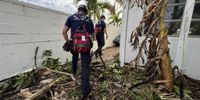David Richardson, the newly appointed head of the Federal Emergency Management Agency (FEMA), stunned agency staff on Monday, June 2, 2025, by stating that he was unaware the United States even had a hurricane season. The comment came during a tense all-hands briefing just one day after the official start of the hurricane season on June 1, which is expected to last through November.
Richardson’s remark left many FEMA employees bewildered and concerned. Some interpreted the statement as an ill-timed joke, while others feared it exposed a troubling lack of preparedness at the helm of a critical federal agency responsible for disaster response. According to Reuters, staff were unsure whether to take the comment seriously or as humor, but the timing could hardly have been worse given the looming threat of a busy hurricane season.
The National Oceanic and Atmospheric Administration (NOAA) recently forecasted up to 10 hurricanes for the 2025 season, heightening the urgency for FEMA to be ready. Yet, Richardson, who assumed leadership in early May, revealed during the briefing that FEMA would not be releasing an updated hurricane disaster response plan as previously promised. Instead, the agency plans to revert to the 2024 response protocols, raising eyebrows among staff who are already grappling with significant workforce reductions and program cuts.
FEMA’s workforce has shrunk dramatically in recent months. Since January 2025, roughly 10% of employees have departed, including many senior leaders. Projections suggest that by the end of the year, the agency will lose nearly 30% of its workforce, shrinking from about 26,000 to approximately 18,000 employees. This reduction comes at a critical time when climate change is intensifying the destructiveness and financial toll of hurricanes across the United States.
During the briefing, Richardson also rescinded FEMA’s 2022-2026 strategic plan, describing it as containing “goals and objectives that bear no connection to FEMA accomplishing its mission.” This move has added to the unease within the agency, as it signals a shift away from previously established disaster preparedness frameworks without clear alternatives.
Adding to the controversy, Richardson’s background is notably lacking in disaster management experience. A former Marine combat veteran and martial-arts instructor, he was appointed by Homeland Security Secretary Kristi Noem in early May 2025, replacing the previous acting FEMA chief who had voiced opposition to eliminating FEMA. Richardson has been vocal about his commitment to enforcing former President Donald Trump’s agenda, promising staff on his first day that he would “run right over” anyone who obstructs the president’s mission.
In the wake of Richardson’s comments and the agency’s internal turmoil, political leaders have expressed harsh criticism. Senate leader Chuck Schumer took to X (formerly Twitter) to question Richardson’s continued tenure, writing, “And I’m unaware of why he hasn’t been fired yet.” Representative Bennie Thompson told Reuters, “Suffice to say, disaster response is no joke. If you don’t know what or when hurricane season is, you’re not qualified to run FEMA. Get someone knowledgeable in there.”
The Department of Homeland Security has sought to downplay the situation. A spokesperson told CNN and Reuters that Richardson’s remark was made in jest and reaffirmed that FEMA remains “laser focused on disaster response, and protecting the American people.” They emphasized that under Secretary Noem and Richardson’s leadership, FEMA is transitioning to a streamlined disaster response organization aimed at enabling states to provide relief directly to citizens.
However, the apparent disconnect between FEMA’s leadership and the realities of hurricane season preparedness has left many within and outside the agency uneasy. Staffers questioned how reverting to last year’s hurricane response plan could be effective when key programs have been eliminated and the workforce has been sharply cut. The agency’s internal briefing did not clarify how FEMA plans to meet the demands of a potentially severe hurricane season under these constraints.
Climate change continues to exacerbate the frequency and severity of hurricanes, causing hundreds of millions of dollars in damage and claiming numerous lives annually across vulnerable U.S. states. Experts warn that the increasing intensity of storms demands robust and well-prepared federal disaster response capabilities.
Richardson’s leadership style and priorities have raised further questions about FEMA’s direction. His pledge to carry out the president’s agenda “with single-minded intensity” and his warning to staff not to “get in [his] way” have contributed to a climate of uncertainty and apprehension within the agency.
The Department of Homeland Security has also installed more than half a dozen officials into key FEMA roles, many of whom, like Richardson, have limited experience in disaster management. This reshuffling has coincided with a significant downsizing, leaving FEMA’s capacity to respond to emergencies in doubt as the hurricane season unfolds.
As the nation braces for what NOAA predicts could be an active hurricane season, FEMA’s internal struggles and leadership controversies cast a shadow over the federal government’s ability to respond effectively to natural disasters. The agency’s future direction remains unclear as it navigates workforce cuts, strategic plan cancellations, and leadership questions at a time when disaster readiness is more critical than ever.
For the millions of Americans living in hurricane-prone areas, the stakes could not be higher. With Richardson at the helm and the agency in flux, the question remains: is FEMA truly prepared to face the storms ahead?


